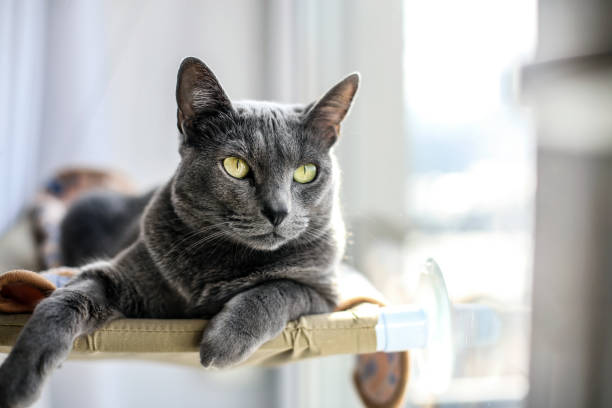Russian Blue

History:
The Russian Blue is an elegant and reserved breed believed to have originated in the port city of Arkhangelsk in northern Russia. These cats were likely brought to Europe by sailors in the 1860s and were first exhibited in England in 1875. Known for their luxurious blue-grey coat and vivid green eyes, the breed quickly gained popularity, especially in Britain and Scandinavia. Over time, breeders refined the Russian Blue’s appearance and temperament, emphasising its gentle, intelligent nature. The breed is valued for its calm demeanour, loyalty, and hypoallergenic qualities, making it a favourite among cat lovers seeking a quiet, refined companion.
Size: Medium-sized cat
Height: 20–25 cm
Weight: 3.5–5.5 kg
Life Expectancy: 15 to 20 years

Breed Appearance:
The Russian Blue is a medium-sized cat with a graceful, muscular body and a fine-boned yet athletic build. Its double-layered coat is short, dense, and plush, with a distinct silvery-blue colour caused by a diluted black gene and silver-tipped hairs. The coat stands out for its softness and sheen, often described as feeling like velvet. One of the breed’s most striking features is its vivid green, almond-shaped eyes, which contrast beautifully with the silvery fur. The Russian Blue’s head is a medium wedge with a straight nose and prominent whisker pads, giving a subtly smiling expression. Its ears are large and wide at the base, while its long, slender legs and tapering tail contribute to its elegant appearance.
Health & Care:
Russian Blues are generally a robust and healthy breed with few breed-specific health problems. They are less prone to genetic issues than some other pedigreed cats, but routine veterinary care remains important. Dental health should be monitored with regular brushing and professional cleanings as needed. Their short, dense coat is relatively low-maintenance but benefits from occasional brushing to reduce shedding and keep the fur looking its best. Providing a balanced diet, regular exercise, and mental stimulation contributes to their long-term well-being. Due to their sensitive nature, they do best in calm, low-stress environments with consistent routines.

Living Conditions:
Russian Blues adapt well to a variety of living spaces, from quiet apartments to larger homes, provided they have a stable, peaceful environment. They prefer predictable routines and may not appreciate loud noises or chaotic households. While independent, they are not aloof and will seek out their favourite humans for companionship and affection. These cats enjoy cosy spots, soft bedding, and watching the world from a perch. They coexist well with respectful children and gentle pets, though they may need time to warm up to newcomers. Once comfortable, they become deeply bonded and affectionate family members.
Grooming:
The Russian Blue’s unique double coat requires minimal grooming despite its plush texture. Weekly brushing is usually sufficient to remove loose hairs and reduce shedding. During seasonal changes, a bit more grooming may be needed. Their grooming routine should include basic care such as nail trimming, ear cleaning, and regular dental hygiene to maintain overall health. They are known for being meticulous self-groomers, and their clean habits make them relatively low-maintenance pets. Baths are rarely necessary unless the cat gets into something messy. Their coat's natural lustre is easily preserved with minimal intervention.

Advantages:
-
Russian Blues are affectionate yet independent, forming deep bonds with their owners while being content to entertain themselves for reasonable periods.
-
They are generally quiet, clean, and unobtrusive cats, making them ideal for peaceful households and apartment living.
-
Their short, plush coat requires minimal grooming and is often considered hypoallergenic, suitable for people with mild cat allergies.
-
Russian Blues are intelligent, gentle, and easy to train, responding well to routines and calm, consistent handling.
-
They typically enjoy good health, have a long lifespan, and thrive with basic preventive care, making them a reliable long-term companion.
Disadvantages:
-
Their reserved nature can come off as aloof or shy, especially around strangers, requiring patient socialization.
-
They may become stressed in chaotic or noisy environments and are best suited for calm, structured households.
-
Though affectionate, they can be sensitive and may not tolerate rough handling, making them less suitable for very young children.
-
Their attachment to their owners means they can become lonely or withdrawn if left alone for extended periods without stimulation.
-
While generally healthy, lack of exercise or overfeeding can lead to weight gain, as they have a tendency to become sedentary if not engaged.

